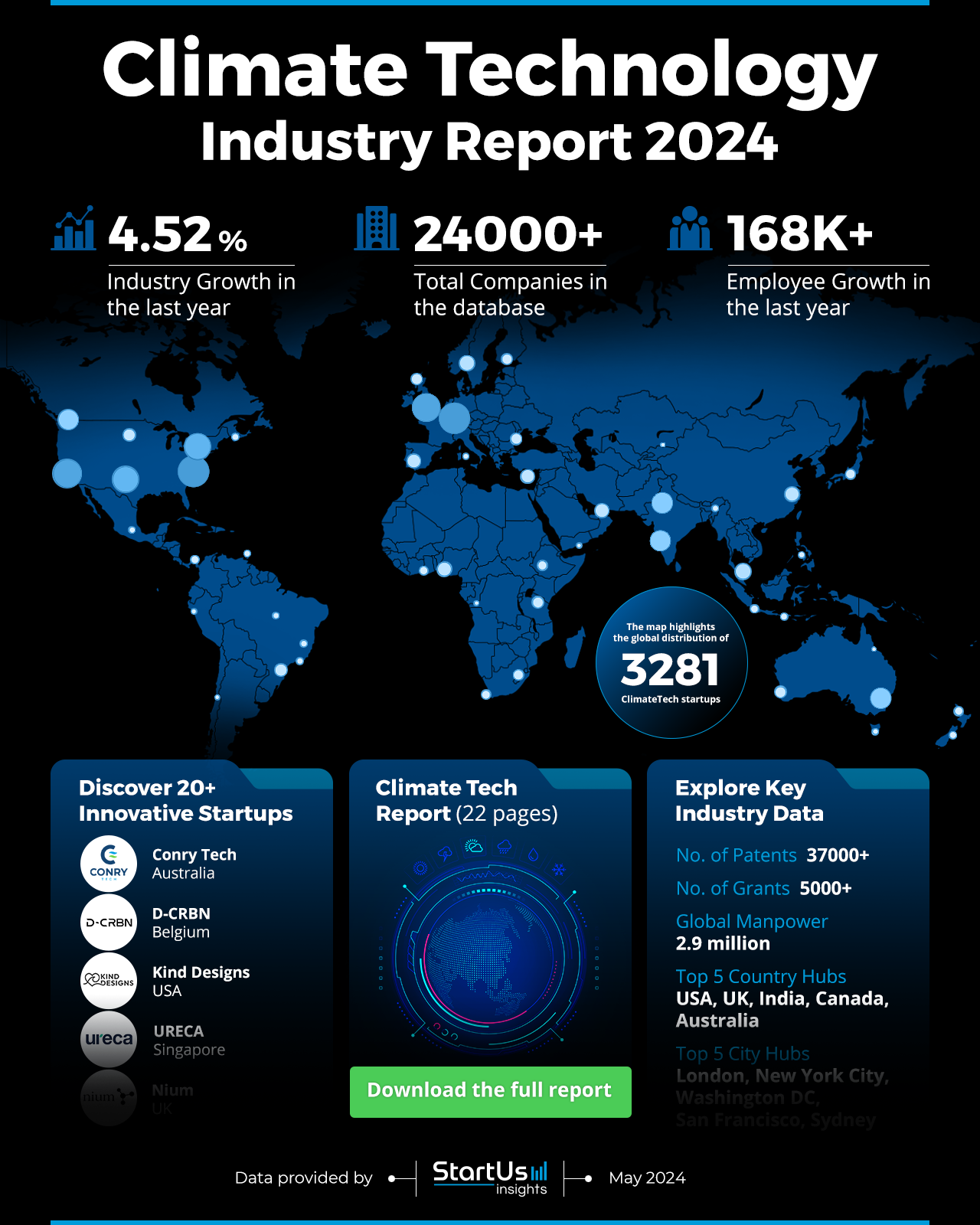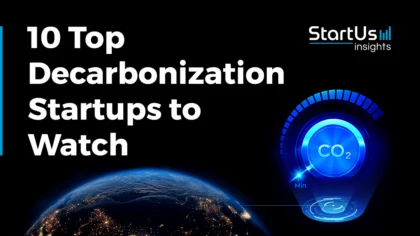Accelerate Productivity in 2025
Reignite Growth Despite the Global Slowdown
The 2024 Climate Tech Report provides an in-depth analysis of the sector’s current landscape, showcasing key trends, and providing market dynamics. This report explores the performance of emerging startups and innovations driving the industry towards sustainability. Focusing on carbon reduction, renewable energy, and sustainable practices, the report offers insights into how these factors shape the climate tech sector.
This report was last updated in July 2024.
This climate tech report serves as a reference for stakeholders within the industry, investors, policymakers, and economic analysts, providing a snapshot of the industry’s health to map its trajectory for innovation and growth in the coming years.
StartUs Insights Climate Tech Report 2024
- Executive Summary
- Introduction to the Climate Tech Report 2024
- What data is used in this Climate Tech Report?
- Snapshot of the Global Climate Tech Industry
- Funding Landscape in the Climate Tech Industry
- Who is Investing in Climate Technologies?
- Emerging Trends in the Climate Tech Industry
- 5 Climate Tech Startups impacting the Industry

Executive Summary: Climate Tech Report 2024
This report is created using data obtained from the Big Data and AI-powered StartUs Insights Discovery Platform, covering more than 4.7 million global companies, as well as 20K+ technologies and emerging trends. We also analyzed a sample of 3200+ climate tech startups developing innovative solutions to present five examples from emerging climate technology trends.
- Industry Growth: The climate tech industry has shown significant growth with a 4.52% increase in the last year, indicating steady development.
- Manpower & Employment Growth: The sector employs over 2.9 million individuals globally, adding 168000 new employees in the past year, highlighting significant employment opportunities.
- Patents & Grants: Innovation within the industry is strong, with over 37000 patents and more than 5000 grants supporting research and development.
- Global Footprint: Leading country hubs include the USA, the UK, India, Canada, and Australia, with key city hubs in London, New York City, Washington DC, San Francisco, and Sydney.
- Investment Landscape: The industry has seen substantial investments, with an average investment value of USD 46 million per funding round and over 8100 funding rounds closed.
- Top Investors: Top investors include European Investment Bank (USD 795 million), JP Morgan (USD 700 million), Goldman Sachs (USD 640 million), Glencore (USD 600 million), and more.
- Startup Ecosystem: Five innovative startups include Conry Tech (Clean HVAC), D-CRBN (CO2 capture & reuse), Kind Designs (3D printed seawall), Ureca (Climate financing), and Wearenium (Ammonia decarbonization).
- Recommendations for Stakeholders: Investors should focus on funding startups and projects that emphasize renewable energy, carbon capture, and efficient resource management. Governments must support the industry through favorable policies, grants, and incentives that promote green technologies and innovation. Companies should invest in research and development to enhance product offerings, improve efficiency, and reduce environmental impact, ensuring they remain competitive in an evolving market.
Explore the Data-driven Climate Technology Report for 2024
The Climate Tech Report 2024 uses data from the Discovery Platform and encapsulates the key metrics that underline the sector’s dynamic growth and innovation. The climate tech industry has shown significant growth and innovation, as illustrated by key data points highlighted in this heatmap. Our database includes 3281 startups and over 24000 companies globally, showcasing a diverse and expansive sector. The industry experienced a growth rate of 4.52% in the last year, underscoring its steady development and capacity for expansion.
Innovation within the climate tech industry is robust, with over 37000 patents and more than 5000 grants supporting research and development.
The sector employs 2.9 million individuals worldwide, with a substantial addition of 168000 new employees in the past year. Leading country hubs driving this growth include the USA, the UK, India, Canada, and Australia. Key city hubs fostering innovation and development in climate tech are London, New York City, Washington DC, San Francisco, and Sydney. The heatmap above visualizes these data points, highlighting regions with significant industry activity and innovation.
What data is used to create this climate tech report?
Based on the data provided by our Discovery Platform, we observe that the climate tech industry ranks among the top 5% in the following categories relative to all 20K topics in our database. These categories provide a comprehensive overview of the industry’s key metrics and inform the short-term future direction of the industry.
- News Coverage & Publications: The industry saw significant news coverage and publications, with over 447000 publications last year.
- Funding Rounds: Our database records more than 8,100 funding rounds, showcasing robust investment activity.
- Manpower: The climate tech industry employs over 2.9 million workers, having added more than 168000 new employees last year.
- Patents: With more than 37000 patents, the industry demonstrates strong innovation and intellectual property growth.
- Grants: The industry has secured over 5000 grants, highlighting substantial research and development funding.
- Yearly Global Search Growth: Yearly global search growth for the industry stands at 18.58%, indicating increasing interest and visibility.
A Snapshot of the Global Climate Tech Industry
The climate tech industry has shown substantial growth and investment activity over the past year, as reflected in key metrics. The sector experienced significant employee growth, adding 168000 new employees, contributing to a total of over 24000 companies globally. This expansion highlights the industry’s resilience and its capacity to generate employment opportunities.
Explore the Funding Landscape of the Climate Tech Industry
Investment in the climate tech industry has been robust, with an average investment value of USD 46 million per funding round. The industry has attracted over 2800 investors, indicating strong confidence in its potential and innovation. There have been more than 8100 funding rounds closed, showcasing a high level of investment activity and interest.
Further, over 3500 companies have received investments, demonstrating a broad distribution of funding across various enterprises within the sector. This widespread investment supports the industry’s growth, development, and ongoing innovation, positioning it as a dynamic and evolving field within the global economy.
Who is Investing in Climate Technologies?
The climate tech industry has attracted substantial investments, with top investors contributing more than USD 4 billion combined. This significant financial support highlights the industry’s potential and ongoing innovation.
- European Investment Bank has invested USD 795 million in 6 companies.
- JP Morgan has invested USD 700 million in 4 companies.
- Goldman Sachs has invested USD 640 million in 5 companies.
- Glencore has invested USD 600 million in 2 companies.
- Warburg Pincus has invested USD 589 million in 4 companies.
- Breakthrough Energy Ventures has invested USD 467 million in 18 companies.
These top investors play a crucial role in driving the industry’s growth and innovation, supporting a wide range of companies and projects.
Access Top Climate Tech Innovations & Trends with the Discovery Platform
Regenerative Agriculture is a rapidly expanding trend within the climate tech industry, encompassing 1390 companies and employing 108000 individuals. This sector focuses on sustainable farming practices that restore soil health, enhance biodiversity, and capture carbon. In the past year, regenerative agriculture added 10,000 new employees, reflecting its growing significance. The annual growth rate of 54.55% underscores the increasing adoption of these eco-friendly practices.
Carbon Capture & Storage (CCS) is a vital segment in the climate tech industry, with 833 companies and 138000 employees. This technology aims to capture and store carbon dioxide emissions from industrial processes, preventing them from entering the atmosphere. The sector saw 10000 new employees last year, highlighting its expanding role in combating climate change. With an annual growth rate of 8.82%, CCS technologies are gaining traction.
Clean Energy remains a cornerstone of the climate tech industry, involving 10014 companies and employing 1 million individuals. This sector focuses on renewable energy sources such as solar, wind, and hydroelectric power to reduce dependence on fossil fuels. The industry experienced significant growth, adding over 71000 new employees in the past year. The annual growth rate of 7.35% reflects steady advancements and increasing adoption of clean energy technologies.
5 Top Examples from 3200+ Innovative Climate Tech Startups
The five innovative startups showcased below are picked based on data including the trend they operate within and their relevance, founding year, funding status, and more. Book a demo to find promising startups, emerging trends, or industry data specific to your company’s needs and objectives.
Conry Tech enables Clean HVAC Solutions
Australian startup Conry Tech develops advanced energy storage solutions for the climate tech industry. Its proprietary platform, PowerGrid, integrates cutting-edge battery technology to optimize energy storage and distribution. PowerGrid ensures efficient energy management by balancing supply and demand, reducing reliance on fossil fuels. The system features high-capacity batteries that store excess renewable energy for later use.
D-CRBN offers Carbon Capture & Reuse Solutions
Belgian startup D-CRBN develops advanced carbon capture and utilization technology for the climate tech industry. Its proprietary platform, CARBON X, captures CO2 emissions from industrial sources efficiently. The technology converts captured CO2 into valuable products like biofuels and chemicals, promoting resource circularity. CARBON X integrates seamlessly with existing infrastructure, ensuring minimal disruption during implementation. The platform uses innovative materials and processes to enhance capture efficiency and product yield.
Kind Designs builds a 3D Printed Seawall
Kind Designs is a US-based startup developing sustainable coastal protection solutions using advanced technology and innovative materials. Their flagship product, Reefblocks, uses marine-friendly concrete to create artificial reefs that combat erosion. Reefblocks enhance coastal resilience by absorbing wave energy and providing habitats for marine life. The modular design of Reefblocks allows for easy installation and adaptability to various coastal environments.
URECA enables Energy Management and Climate Financing
Singapore-based startup Ureca develops advanced technology solutions to optimize energy management and sustainability. Their platform, Ureca Power, integrates smart grid technology to enhance energy distribution and efficiency. The Ureca Power system uses real-time data analytics to monitor and manage energy consumption. This technology enables efficient load balancing and reduces energy waste. The system’s scalability makes it suitable for various applications, from residential to industrial.
Nium facilitates Ammonia Decarbonization
UK-based startup Wearenium develops advanced hydrogen production technology for clean energy solutions. Its innovative platform, Wearenium Hydrogen, utilizes an electrolysis process to efficiently generate hydrogen from water. This technology ensures high-purity hydrogen production with minimal energy consumption. The company’s hydrogen production technology supports various industrial applications, reducing reliance on fossil fuels. Wearenium also focuses on scalability, making its system adaptable for both small and large-scale operations.
Gain Comprehensive Insights into Climate Tech Trends, Startups, or Technologies
The 2024 Climate Tech Industry Report highlights the sector’s role in advancing global sustainability and environmental responsibility. Significant growth areas, such as regenerative agriculture, carbon capture and storage, and clean energy, showcase the industry’s commitment to advancing innovation. Contact us to explore all 3200+ startups and scaleups, as well as all industry trends impacting industries and companies worldwide.









